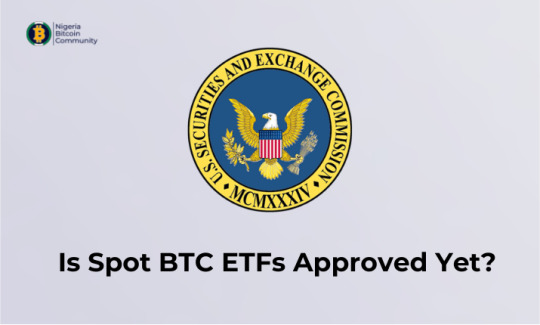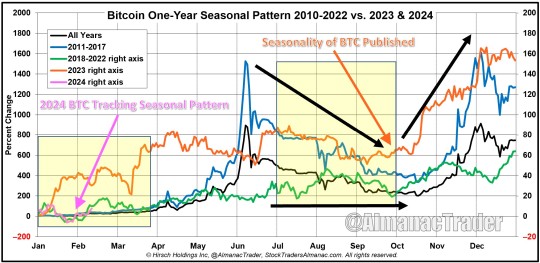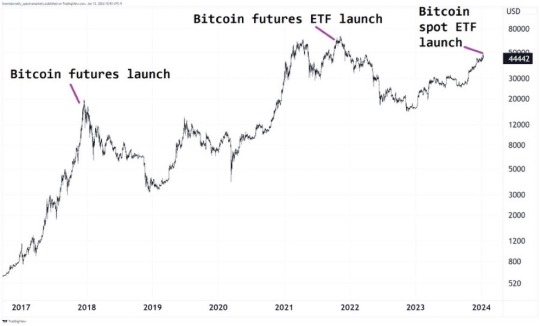#bitcoin etf approve
Text
Understanding Bitcoin ETFs: How They Work and Their Benefits

Introduction
A Bitcoin ETF (Exchange Traded Fund) offers a bridge between traditional stock market investing and the digital currency world of Bitcoin. By investing in a Bitcoin ETF, individuals can speculate on the price of Bitcoin using their regular brokerage accounts instead of buying directly through a cryptocurrency exchange. This approach not only simplifies the investment process but also integrates it with traditional investment methods.
What Exactly is a Bitcoin ETF?
Simplifying Investment in Bitcoin
A Bitcoin ETF is similar to any other ETF that represents a commodity or a basket of assets. The key difference is that a Bitcoin ETF is tied to the price of Bitcoin, the digital currency. This means that the ETF’s value will fluctuate with the price of Bitcoin. If Bitcoin’s price goes up, so does the ETF’s price and vice versa.
Investing in a Bitcoin ETF can be more straightforward and potentially safer than buying Bitcoin directly. You don’t need to deal with cryptocurrency exchanges or worry about securing a digital wallet. Moreover, there’s no risk of losing access to your investment due to forgotten passwords or wallet issues.
Cost Considerations
While Bitcoin ETFs might save on some costs like exchange fees, they do incur management fees and brokerage commissions, which can add up depending on the amount invested and the fund’s fee structure.
How Does a Bitcoin ETF Function?
The Mechanism Behind the Scenes
Bitcoin ETFs operate by purchasing actual Bitcoins and issuing shares that represent a claim on those Bitcoins. These shares are traded on conventional stock exchanges, making them accessible to anyone with a brokerage account.
Security Measures
To ensure security, the Bitcoins are stored in high-security digital wallets, often involving multiple layers of encryption and security protocols to thwart hacking attempts.
Regulation and Oversight
Bitcoin ETFs are usually offered by established financial institutions and are subject to strict regulations and oversight, which can provide investors with a level of transparency and trust not always available in the cryptocurrency market.
Why Choose a Bitcoin ETF?
For many, the appeal of Bitcoin ETFs lies in their simplicity. Investors can gain exposure to Bitcoin’s price movements without needing to understand the technical details of cryptocurrency trading.
Bitcoin ETFs adhere to established financial regulations, making them a more secure option for investors wary of the sometimes murky regulatory waters of the crypto world.
Pros and Cons of Bitcoin ETFs
Advantages
Ease of Use: Investing in a Bitcoin ETF is as simple as buying stocks. No need to interact with a cryptocurrency exchange or secure a digital wallet.
Regulatory Safety: Bitcoin ETFs offer a regulated investment avenue, often providing greater security and peace of mind for investors.
Improved Liquidity: Bitcoin ETFs can be bought and sold like stocks, providing greater liquidity compared to direct cryptocurrency investments.
Disadvantages
Management Fees: Investors in Bitcoin ETFs must pay management fees, which can reduce overall returns.
Market Volatility: The value of a Bitcoin ETF is directly linked to the price of Bitcoin, which can be highly volatile.
Security Risks: Despite high security standards, the potential for security breaches exists, as with any digital investment.
Conclusion
Bitcoin ETFs provide a practical and accessible way for more investors to participate in the Bitcoin market without the need for direct exposure to cryptocurrencies. While they offer several advantages such as ease of use, regulatory safety, and liquidity, potential investors should also consider the associated costs, market volatility, and security risks. As with any investment, it’s crucial to perform due diligence and consider both the potential risks and rewards.
Thinking about investing in a Bitcoin ETF?
Remember, it’s essential to consult with a financial advisor to ensure that this type of investment fits your overall financial strategy and goals.
Muhammad Hussnain
Visit us on social media: Facebook | Twitter | LinkedIn | Instagram | YouTube TikTok
0 notes
Text
Spot Bitcoin ETFs: A Deep Dive into the Pros and Cons of Purchasing and How to Get Started
Introduction:
The approval of spot Bitcoin ETFs by the SEC on January 10, 2024, marked a significant milestone in the cryptocurrency landscape. Investors and traders seeking a simplified way to invest in Bitcoin found a new avenue for diversifying their portfolios. This comprehensive guide explores the intricacies of Bitcoin ETFs, detailing their definition, functionality, differences from direct Bitcoin investment, where to buy them, and the various methods of purchase.
What Is a Bitcoin ETF?
A Bitcoin Exchange-Traded Fund (ETF) is a fund that holds various assets and is traded on the exchange like stocks. Unlike traditional investments, ETFs provide a blend of stocks, bonds, and mutual funds, allowing investors to trade them throughout the day at different prices. Bitcoin ETFs specifically focus on assets related to Bitcoin, with investment firms managing these funds.
How Does Bitcoin ETF Work?
Bitcoin ETFs operate similarly to other ETFs, where the asset management company purchases Bitcoin ETFs and issues shares. Investors, upon buying these shares, gain exposure to the fund, where Bitcoin ETFs are stored as assets. ETFs can be traded on traditional stock exchanges, simplifying the investment process. Investors pay an annual fund management fee to the institute managing the fund.
Difference Between Investing in a Bitcoin ETF and Bitcoin:
One major distinction is that Bitcoin ETFs can be traded through traditional brokerage accounts, eliminating the need for cryptocurrency exchanges. Bitcoin ETFs are regulated by the SEC, providing a level of oversight and reducing volatility compared to direct Bitcoin investments. While Bitcoin itself lacks regulatory oversight, Bitcoin ETFs offer a familiar environment to new investors.
Where Can You Buy Bitcoin ETFs?
Bitcoin ETFs, post-SEC approval, are available for purchase through major fund managers, listed on exchanges like NYSE, Nasdaq, and CBOE. Notable fund managers offering Bitcoin ETF shares include ARK, Bitwise, iShares, Fidelity, VanEck, Grayscale, Franklin, Hashdex, Invesco, WisdomTree, and Valkyrie. Each has its own expense ratio and waiver periods/asset limits.
Ways To Buy Bitcoin ETFs:
Investors have multiple options for purchasing Bitcoin ETF shares:
Online Brokerage Accounts: Utilize platforms like Robinhood, Charles Schwab, or others to buy Bitcoin ETF shares through a traditional brokerage account.
Financial Advisers: Seek guidance from financial advisers who can assist in the investment process, with a growing interest in ETFs among financial advisors.
ETF Issuers: Directly visit the issuer's portal to buy ETFs, requiring a brokerage account with affiliated brokerages.
Crypto Exchanges: Anticipate the launch of Bitcoin ETF services on major crypto exchanges like Coinbase and Kraken, expected in 2024.
How To Buy Bitcoin ETFs:
Follow these steps to purchase Bitcoin ETFs:
Create a Brokerage Account: Choose a brokerage supporting Bitcoin ETFs, such as Charles Schwab or Vanguard. Install the brokerage application or use the official portal to sign up.
Finance the Account: Fund the newly created account through electronic funds transfer, wire transfer, or cheques via mail.
Inspect All Bitcoin ETFs: Research key details like expense ratios, tracking strategy, and issuer information for each ETF before making a decision.
Choose Your Preferred Bitcoin ETF & Order: Select the ETF aligning with your investment goals, enter the ticker symbol on the brokerage platform, specify the number of shares, set orders, and confirm before submission.
Monitor Investments Regularly: Keep a close eye on investment performance through the brokerage account, adjusting strategies as needed based on market trends.
Pros and Cons of Bitcoin ETFs:
Pros:
Diversification: Bitcoin ETFs offer diversified portfolios, reducing risks for investors.
Accessibility: Traditional brokerage accounts simplify the buying and selling of Bitcoin ETFs.
Regulatory Oversight: SEC regulation enhances stability and reduces volatility compared to direct Bitcoin investment.
Tax Efficiency: ETFs are eligible for tax efficiency, contributing to potential cost savings.
Cons:
Management Fees: Investors might incur substantial management fees for heavily investing in Bitcoin ETFs due to competitive pressure.
Value Reflection: Bitcoin ETFs might not precisely reflect the true value of Bitcoin due to diversification with other assets.
Inability to Trade Bitcoin: Unlike Bitcoin itself, Bitcoin ETFs cannot be directly traded or swapped with other digital assets.
Conclusion:
Spot Bitcoin ETFs have opened new investment opportunities for traders and investors, offering a way to diversify portfolios. The SEC's approval of 11 spot Bitcoin ETFs on January 10, 2024, has sparked discussions about potential risks but also brings the promise of increased market liquidity and more stable prices. As the cryptocurrency landscape continues to evolve, Bitcoin ETFs provide a regulated and accessible avenue for those seeking exposure to the crypto world without the complexities of direct Bitcoin investment.
0 notes
Text
#Bitcoin ETFs#SEC#cryptocurrency market#Spot Bitcoin ETF approval#cryptocurrency investment#ETFs vs. Direct Investment
0 notes
Photo

A historic day for #Bitcoin and the crypto world! 🚀👀 The SEC's approval marks a major milestone. Bitcoin has truly come of age. Celebrating this moment with
#BitcoinLaserEyes. Let's enjoy this victory! #CryptoMilestone #SECBigDay #BitcoinETF #SEC #BTC
https://xtremcryptobabe.com/a-historic-day-in-crypto-celebrating-bitcoins-milestone-with-the-sec-approval/
1 note
·
View note
Text
Spot Bitcoin ETF Approval Post: No 2FA or Market Manipulation By SEC?
Happy New Year, dear reader! Hope you enjoyed the holidays.
Today’s post is on the fake X post of the SEC about Spot Bitcoin ETF approval.
Bitcoin ETF approval has been all the rage from the end of 2023 to the beginning of 2024.
A date (10/01/2024) has even been fixed for the SEC to give their final verdict on the issue.
Suddenly, a fake approval post was made, and the SEC Chair came out to…

View On WordPress
1 note
·
View note
Text
Will BlackRock (BLK) make money from a Bitcoin ETF?
America’s largest asset manager BlackRock (BLK) wants to invest in the Bitcoin (BTC) market.
Specifically, BlackRock is trying to register an iShares Bitcoin Trust with the US Securities and Exchange Commission (SEC). “The assets of the Trust consist primarily of bitcoin held by a custodian on behalf of the Trust,” the 15 June 2023 SEC filing states. “The Trust seeks to reflect generally the…

View On WordPress
#Can BlackRock take Bitcoin Mainstream?#Why is BlackRock investing in Bitcoin (BTC)?#Will BlackRock (BLK) make money from a Bitcoin ETF?#Will the SEC Approve BlackRock’s Bitcoin (BTC) ETF?
0 notes
Text
madoffnak elég volt 4 befektető, aki tudta mi folyik, hogy évtizedekig tolja a játékot. a bitcoin/kripto mögött jóval több jólértesült arc va, aki része a csalásnak
29 notes
·
View notes
Text
> "A highly anticipated decision by the US Securities and Exchange Commission on whether to approve a spot-Bitcoin exchange-traded fund quickly morphed into a major cybersecurity incident on Tuesday.
> "The SEC’s X account was compromised and a fake post claiming that the agency had green lit plans for the products fueled a brief surge in the price of the world’s biggest cryptocurrency. It also has sparked an investigation by US authorities into how a social media account at Wall Street’s main regulator was compromised. …"
Look, I have no inside information, but most of the reporting I have read about spot Bitcoin ETFs has said that
1. the SEC is going to approve them,
2. by the end of today, and
3. this is public knowledge that everyone believes.
So you would think it would be pretty priced in? It just does not seem to me like there would be a ton of alpha in (1) constantly refreshing the SEC’s Twitter account, (2) looking for a tweet saying “okay spot Bitcoin ETFs are cool now,” and (3) buying Bitcoin on the news. Which implies there would not be a ton of alpha in (1) buying a bunch of Bitcoin, (2) hacking the SEC’s Twitter account, (3) tweeting “okay spot Bitcoin ETFs are cool now” and (4) selling your Bitcoin into the resulting enthusiasm.
[...]
Doesn’t it seem at least possible that this hack was just trolling? It didn’t move Bitcoin prices that much, and it shouldn’t have: The fake announcement was something that everyone expects to actually be true today. But it is very funny? The key element of online trolling is irony, and there is plenty of irony here. Like:
1. The crypto community and the SEC do not particularly like each other: Gensler’s SEC has launched a broad and aggressive crackdown on crypto, and it is only going to (probably!) approve spot Bitcoin ETFs today because a court forced it to. If you’re a Bitcoin enthusiast with the skills to hack the SEC’s Twitter, you might want to manipulate the price of Bitcoin, but you might also just want to make the SEC look bad.
2. Having the SEC (1) announce that Bitcoin ETFS are approved, (2) walk back that announcement, and then (3) announce it again, for real this time, the next day, really is quite embarrassing. Like if the hacker made the SEC say something outlandish and false, that would be a little funny. But making the SEC say something true a day early is extremely funny.
3. In addition to cracking down on crypto, one of the SEC’s big regulatory priorities under Gensler has been punishing companies for cybersecurity incidents.[2] The SEC once sued a company for using weak passwords, and its enforcement director said that the case “underscores our message to issuers: implement strong controls calibrated to your risk environments.” But apparently the SEC’s Twitter was compromised because it didn’t turn on two-factor authentication. Nyah nyah nyah nyah nyah!
[...]
Anyway, the great counter-troll here would be for the SEC to announce today “you know what, all the Bitcoin ETF applications are rejected, we’ll see you in court again. We were going to approve them, but it turns out that the Bitcoin market is still too vulnerable to manipulation, as you can tell by the fact that someone hacked our Twitter to manipulate Bitcoin.”
17 notes
·
View notes
Text
by Amy Castor and David Gerard
9 notes
·
View notes
Text
Ethereum ETF Enthusiasm and Upgrades Propel a Revival in the Market
As the cryptocurrency landscape undergoes rapid transformations, Bitcoin maintains its unyielding dominance, particularly evident in the realm of open interest for derivative markets. The open interest in Bitcoin's perpetual swaps has surged to an impressive 66.2%, showcasing the digital giant's resilience and enduring appeal in the crypto market.
Glassnode's data reveals a noteworthy evolution in Bitcoin's position. In January 2022, Bitcoin's perpetual swaps accounted for 55% of the total open interest, solidifying its undisputed dominance in the crypto derivatives arena. Fast forward to 2024, and Bitcoin's dominance has further strengthened, reaching a commanding 66.2%. This surge underscores Bitcoin's enduring attractiveness and its role as a stalwart digital asset.
0 notes
Text
Seasonality of #Bitcoin Update: 2024 $BTC Tracking

My 9/26/23 groundbreaking seasonal #BTC study w/ @crypto_birb on September 26,2023, right at the seasonal sweet spot predicted Q4 rally. $BTC delivered and ripped higher from October to early January. The big SEC spot Bitcoin ETF approval was a classic sell on the news event. In 2024 Bitcoins is once again tracking seasonals. This suggests a rally to mid-late-Feb then dip to Ides of March ahead April 2024 halving.
4 notes
·
View notes
Text
Comparison ETPs and ETFs
Exchange-traded products (ETPs) and exchange-traded funds (ETFs) are both important components of a diversified investment portfolio. This guide explores the differences, structures, and roles of ETPs and ETFs in various investment strategies.
Key Insights:
Insights include the unique features of ETPs and ETFs in terms of regulation, liquidity, and structure. While ETFs offer intraday liquidity, trading flexibility, and lower costs compared to other ETPs, each type caters to different asset classes with specific risks and structures. Additionally, ETFs provide superior diversification and investor protections as they are regulated under the Investment Company Act of 1940. When choosing between ETPs and ETFs, factors such as cost, risk tolerance, and desired market exposure should be considered. Lower-risk strategies often prefer ETFs for their lower costs while higher-risk strategies may utilize certain ETPs like leveraged or inverse products.
After previously rejecting them under former Chair Jay Clayton, the U.S. Securities and Exchange Commission (SEC) has now given its approval for the listing and trading of various spot bitcoin exchange-traded product (ETP) shares. The decision has been influenced by recent legal developments and changing circumstances, and is focused specifically on ETPs that hold bitcoin rather than a wider range of crypto assets. The SEC has emphasized the need for complete transparency, investor safeguards, and regulation when it comes to these products. However, the regulatory body has also cautioned that bitcoin is a highly speculative and volatile asset, and has advised investors to exercise caution.

Understanding ETPs and ETFs:
ETPs (Exchange-Traded Products):
Investment funds traded on stock exchanges.
Track underlying indices, commodities, or assets.
Offer trading convenience and access to diverse asset classes.
ETFs (Exchange-Traded Funds):
Diversified portfolios reflecting underlying indices.
Traded like stocks on an exchange with intraday liquidity.
Combine features of stocks and mutual funds.
ETPs Overview: ETPs encompass a variety of investment products, including ETFs, ETNs, ETMFs, and ETCs. Each category tailors its structure to different assets, providing a convenient tool for portfolio diversification.
Traditional Giants Embrace Bitcoin:
The propulsion of Bitcoin Adoption reached new heights when major giants joined the fray. Esteemed companies like Tesla, Overstock, and Microsoft have embraced Bitcoin as a viable payment option, marking a pivotal moment in mainstream acceptance. These household names not only validate the legitimacy of cryptocurrency but also serve as trailblazers, inspiring smaller businesses to explore the advantages of integrating Bitcoin into their payment methods. Basically in the year 2021, Tesla made waves by announcing that customers could purchase their electric vehicles using Bitcoin. Beyond introducing a novel purchasing avenue, this decision sparked conversations about the prospective role of cryptocurrencies within the automotive industry. Similar strategic moves by other influential companies have collectively contributed to the narrative that Bitcoin is transitioning into a recognized and widely accepted form of payment.
This evolution underscores Bitcoin's journey from being perceived solely as an investment opportunity to emerging as a practical and legitimate means of transaction in today's dynamic business landscape.
ETFs Unveiled:
Hold diversified portfolios of investments.
Traded on exchanges, mirroring underlying indices.
Include various investments like stocks, commodities, bonds, or crypto.
Offer intraday liquidity and real-time pricing.
ETPs vs. ETFs: ETPs and ETFs, while both traded on exchanges, differ in structure, regulation, and trading characteristics. ETFs, subject to stringent oversight, often exhibit superior liquidity and narrower bid-ask spreads compared to ETPs.
Structure and Regulation: ETFs, registered and regulated by the SEC under the Investment Company Act of 1940, adhere to strict oversight. Other ETPs, like ETNs, may lack board oversight, presenting a less rigorous regulatory framework.
Trading and Liquidity: ETFs generally boast higher liquidity and narrower bid-ask spreads than ETPs. The popularity, trading volume, and underlying securities influence the bid-ask spread, making ETFs more appealing for their trading flexibility.
Diversification and Risk Management: Both ETPs and ETFs offer diversification, but the extent depends on the specific product. ETFs, with broad underlying assets, usually provide extensive diversification. However, risks arise, particularly with leveraged or inverse ETFs impacting tax efficiency.
Types of ETPs and ETFs: Passive and active management options cater to diverse investment strategies. Passive ETFs replicate index performance, offering cost-effectiveness, while active ETFs aim to outperform by adjusting portfolios based on market conditions.
Sector and Industry Focus: ETFs and ETPs enable targeted investments in sectors or industries. Sector ETFs cover broader categories, while industry ETFs concentrate on specific industries within sectors, allowing focused exposure.
Leveraged and Inverse Products: Leveraged ETPs amplify underlying index performance using financial derivatives, presenting higher returns and risks. Inverse ETPs aim for returns inversely correlated to specific benchmarks, suitable for sophisticated investors.
Costs and Fees: Expense ratios, covering operating costs, vary between ETPs and ETFs. ETFs generally incur lower fees, with expense ratios around 0.16% for index ETFs. Consideration of brokerage commissions and transparent/hidden fees is crucial for cost-effective investing.
Choosing Between ETPs and ETFs: Deciding between ETPs and ETFs hinges on investment goals, risk tolerance, and exposure preferences. ETFs suit lower risk appetites, providing diversified options, while certain ETPs, like leveraged products, cater to investors comfortable with higher risk levels.
Advantages and Disadvantages: ETFs, as a subset of ETPs, offer benefits such as diversification, liquidity, and tax efficiency. Other ETPs, like ETNs or ETCs, present different cost structures and risks. Understanding their advantages and disadvantages aids in informed decision-making.
Real-Life Examples: Examples like SPDR® S&P 500® ETF Trust (SPY) and Bitcoin spot ETFs illustrate the diversity and innovation within ETPs and ETFs, showcasing varied investment options in the market. Moreover, Investors can now gain exposure to the world's largest cryptocurrency, Bitcoin, through recently approved spot ETFs. These cutting-edge ETFs showcase the extensive array of investment opportunities in the realm of ETPs and ETFs.
Potential Risks and Rewards: ETPs and ETFs carry market risks, influenced by volatility, socioeconomic factors, and geopolitical risks. Understanding the inherent risks and potential rewards, including attractive returns from ETNs tied to underlying indices, is vital for investors.
In Conclusion:
Both ETPs and ETFs contribute to effective portfolio diversification, each with unique characteristics. While ETFs are favored for liquidity and low-cost options, a broader spectrum of ETPs caters to specific investment needs. Choosing between them necessitates aligning with overall investment strategies.
3 notes
·
View notes
Text



#Cryptocurrency Trading Made Easy….
On 10 January, the #SEC approved the first 11 applications to list and trade spot #Bitcoin Exchange-Traded Funds (ETFs).
The approved list includes BlackRock iShares Bitcoin Trust, Fidelity Wise Origin Bitcoin Trust and VanEck Bitcoin Trust, as well as a number of #crypto native firms and crypto asset managers such as Grayscale Bitcoin Trust.
• Six of the ETFs will be listed on the Chicago Board Options Exchange (Cboe, A3 stable),
• three on the NYSE (A3 stable) and
• two on Nasdaq (Baa2 stable).
-MCO
3 notes
·
View notes
Text
"Bitcoin Spot ETF Approved" Fake News Rampant… Market Wobbles
[Anchor]
Investors were confused by the spread of fake news that U.S. financial authorities approved a spot exchange-traded fund ETF for the cryptocurrency Bitcoin.
The hacked social media X account was the source, and leading foreign media were also deceived.
I'm reporter Lee Chi-dong.

[Reporter]
News that the U.S. Securities and Exchange Commission and the SEC have approved the spot exchange-traded fund and ETF of the cryptocurrency Bitcoin first appeared on X (X), an old Twitter account, in the early morning of the 10th Korean time.
Some foreign media were quick to tell this, and the price of Bitcoin once rose more than $1,000 and approached $48,000.
This is the highest level since March 2022.
The surge didn't last long.
The Securities and Exchange Commission said the official X account was hacked and that it had not approved Bitcoin's spot ETF.
The price immediately dropped back down to $45,000.
In response to the commotion, the New York Times said, "The cryptocurrency industry was happy for 15 minutes."
U.S. authorities have launched an investigation into the hacking that caused the disturbance.

X has not made an official statement.
Expectations for the approval of the Bitcoin ETF have not been dampened.
There's less than a day left before asset manager Ark Investments has to decide whether to approve the launch of the Bitcoin spot ETF.
"There is also momentum for the Bitcoin spot ETF, where everyone is expecting SEC approval."

In October, the market also fluctuated as fake news related to the approval of Bitcoin ETFs spread through virtual currency media.
I'm Lee Chi-dong, Yonhap News Agency. ([email protected] )
Bitcoin #ExchangeIndexFund_ETF #FakeNews
#btc#eth#bnb#crypto#13 january#cryptocurrency#cryptocurrencies#bitcoin#binance#ethereum#sonart#batdr#batim#bendyandthedarkrevival#bendyandtheinkmachine#BendyDrew#ink demon#theinkdemon#inkbendy#weepingangel#theweepingangel#nonprofit#needlework
3 notes
·
View notes
Text
Understanding the Impact of Bitcoin Halving on Investors

The upcoming Bitcoin halving: the event where the rewards for Bitcoin miners will be cut in half. It's an important event for miners and holds significance for investors as well. After the halving, miners will be rewarded with 3.125 BTC for each block processed instead of the current rate of 6.25 BTC. The purpose of this halving is to control Bitcoin inflation. While the exact date is uncertain, previous halvings have led to price increases and it is expected that retail investors should pay attention to this event. 🪙
The Bitcoin halving has gained a lot of attention due to increased interest in the cryptocurrency industry, especially from institutions. Since the last halving, Bitcoin's price has risen significantly and it has become more mainstream. Historically, halvings have been followed by price surges. Analysts predict that a potential approval of a Bitcoin exchange-traded fund (ETF) combined with the halving could lead to a "craziest bull run of all time." 💰
However, it's important to note that Bitcoin is a volatile asset and the relatively illiquid market may deter traditional investors. The recent crash in Bitcoin's price, along with increased scrutiny from regulators, might make some investors hesitant to enter the market. Nevertheless, there are alternative ways for investors to gain exposure to Bitcoin, such as investing in publicly traded mining companies. Some experts believe that the halving has a bullish effect on Bitcoin's price, while others argue that there is no concrete proof of this. Overall, the halving primarily impacts miners, who will closely monitor the event. 📉
To read the original article, click here.
#Bitcoin #cryptocurrency #investment #Bitcoin-halving
4 notes
·
View notes
Text
The prospect that US residents may soon be able to invest in bitcoin through their brokerage, as if it were a regular stock, has prompted a fresh round of hype in crypto circles—and a surge in crypto prices.
Several investment firms, including heavy-hitters like BlackRock and Fidelity, are queuing up to launch a spot bitcoin exchange-traded fund (ETF) in the US. These funds would track the price of bitcoin, making them the closest thing to investing in the crypto token directly without dealing with a crypto exchange or storing crypto manually, a process fraught with risk.
After a bruising 18 months in which crypto prices buckled, high-profile businesses collapsed, and two crypto figureheads were convicted of crimes in the US, the crypto industry is supposed to be cleaning up its act. That the US Securities and Exchange Commission (SEC) appears to be entertaining a spot bitcoin ETF after years of resistance is seen by some as a signal that crypto is moving beyond its free-wheeling years.
The arrival of such a fund in the US—by far the world’s largest ETF market—“is a significant milestone,” says Samson Mow, a prominent bitcoin evangelist and CEO of bitcoin-centric technology firm JAN3, as it will allow investors to hold bitcoin through a conventional financial product for the first time.
While there is broad consensus around the likelihood of an ETF approval among analysts, the idea that it would be symbolic of the industry’s coming of age is contradicted by the frenzy of speculation around what will happen to the price of bitcoin.
On X, crypto influencers with hundreds of thousands of followers are predicting an ETF will send the price of bitcoin soaring, in posts peppered with the rocket ship emoji. The arrival of a spot bitcoin ETF, claims Mow, will unlock a wave of pent-up demand and lead a “torrent of capital” to “pour into bitcoin.” Institutions and other investors that either cannot or choose not to invest in unregulated financial products will seize the opportunity to invest, he says, driving the price far beyond its previous heights.
An ETF might point to a growing acceptance of bitcoin among legacy financial institutions, but the implications for the price of bitcoin are being both mis- and overstated, ETF analysts warn, and the boosterism on display shows that little about crypto has changed.
Twelve applications for spot bitcoin ETFs are awaiting approval from the SEC. Delays are commonplace, but the agency is due to make a call on some of the applications as early as January 1, 2024. The three ETF analysts who spoke to WIRED expect the SEC to green-light a spot bitcoin ETF at some point next year.
In Canada, Germany, and elsewhere, spot bitcoin ETFs already exist. And US investors have had access to bitcoin futures ETFs, the value of which are correlated with the price of bitcoin, since 2021. The approval of a spot bitcoin ETF in the US is significant because it would, for the first time, give US investors access to a close proxy to bitcoin in a familiar and regulated format.
The attention paid to the topic by crypto trade media emphasizes the current fixation in industry circles. Since this summer, when speculation about the arrival of a spot bitcoin ETF began to ratchet up, crypto news site CoinDesk has published dozens of articles and videos on the topic.
In that same period, crypto markets have experienced dramatic swings, and the price of bitcoin has risen by almost a third. In some cases, price swings have been triggered by rumor and misreporting. On October 16, crypto outlet CoinTelegraph issued a retraction and apology after putting out an erroneous post on X announcing the approval of the first spot bitcoin ETF in the US, based on a screenshot posted by an X user, which led to a buying spree that increased the price of bitcoin by 10 percent.
On November 13, a falsified ETF filing relating to a separate cryptocurrency, XRP, caused a 13 percent rise in the token’s price. By the end of the day, those gains had evaporated. The Financial Times calculated that “imaginary bitcoin ETFs” were already worth 30 times the actual spot bitcoin ETFs already in existence worldwide.
Some ETF analysts, like Aniket Ullal of investment research firm CFRA, share the belief that the arrival of an ETF is likely to increase demand for bitcoin as an investment asset. But the effect on price will not be a “short-term spike,” Ullal says, but rather stretch out over multiple years.
Others say it will have the polar opposite effect to that predicted by figures like Mow, and that the price of bitcoin could plummet as investors attracted by the hubbub quickly cash out their winnings. “The idea that there is a huge pile of demand that will somehow materialize is just not true,” argues Peter Schiff, economist and CEO at asset management firm Euro Pacific. “It’s more of a ‘buy the rumor, sell the fact’ situation.”
The “narrative” that an ETF is a “catalyst for growing demand” has attracted speculators, says Bryan Armour, director of passive research strategies for North America at investment research firm Morningstar. “Hype has always been one of the core tenets of bitcoin. It seems like hype is at an all-time high.”
Figures from research firm Fineqia suggest the volume of crypto trading activity has surged in response to speculation over the approval of a spot bitcoin ETF and its market impact. In mid-November, daily trading volume on crypto exchanges reached $31.4 billion, the highest level in more than six months.
“There’s always the possibility that people are hyping it up for their own benefit,” says Mow, who adds that he doesn’t believe the broader crypto industry—which he considers to be separate from bitcoin and describes as a “grift”—is capable of cleaning up its act. “The crypto industry will keep churning out FTXs and people will keep investing because it’s a spectacle,” he says.
But whether or not bitcoin is different—a mature asset whose legitimacy would be “cemented,” as Mow claims, by an ETF approval—the relentless speculation surrounding it will expose investors to risk. “It is wildly volatile and should be handled carefully,” says Armour. But, he adds, people “hear the siren song and buy in.”
3 notes
·
View notes